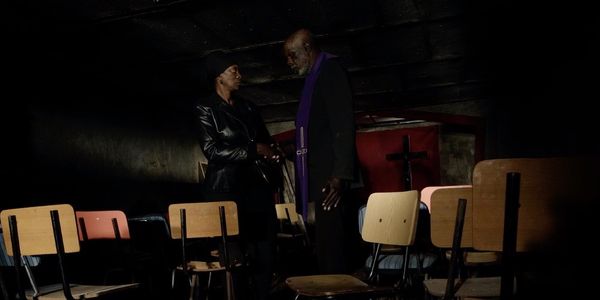VITALINA VARELA: It Always Ends This Way

Soham Gadre is a writer/filmmaker in the Washington D.C. area.…
The cinema of Pedro Costa may consistently revolve around a troupe of recurring characters all living in the present and near the same place – in his case, Lisbon’s Fontinhas neighborhood – but much like his contemporary Lav Diaz, or Bill Douglas before them, his movies are always deeply informed by a complicated and often tragic history. A simple five-minute recap of Portugal’s history would be disingenuous not to include the nation’s totalizing imperial influence on the world, especially following the days of Henry the Navigator and the more renowned Vasco da Gama. One of the most economically and militarily strategic places that Portugal colonized was the Cape Verde islands, now officially known as Cabo Verde.
It is here that we see the history of both Portugal and the history of Pedro Costa’s characters, from Ossos (1997) to his latest film Vitalina Varela, colliding and reckoning with each other. Predominantly taking place in Fontinhas yet again, the movie is also Costa’s first since Casa de Lava to feature sequences in Cabo Verde. These two places are inextricably linked through immigration of peoples who were brought from continental Africa and to Cabo Verde as part of the slave trade. Through centuries they eventually became rooted in the area, but this settling was on unstable grounds and immigration to Portugal, the nation that enslaved their ancestors, was to be their new home.
A Deeply Haunting Confrontation of Marriage…
The cycle of violence, oppression, and crippling economic poverty that is nearly a historical constant for people of former European colonies in Africa, is all-apparent in the Fontinhas neighborhood where Costa shoots his cinema. In haunting high contrast lighting, amid crumbling cement, dry soil, and cracking foundations, Costa’s characters are perpetually picking up pieces of their lives like fallen ceiling tiles.
It is squalor that is rooted in a history that is expansive and unanswerable, looked upon by capitalists as the sorry state of a “once world-dominant empire of Portugal” when in reality, it is the real centuries-lasting effect of what imperialism does to its thralls. It always ends this way.

The namesake of Vitalina Varela is a Cape Verdean woman who comes to Lisbon to bury her husband and immediately finds out that she has missed his funeral. What follows is a deeply haunting confrontation of a marriage that was doomed for a long time. Vitalina has visions of her late husband, chastises him, says everything that she has wanted to say for years but couldn’t. She meets long-time Costa regular Ventura, a priest in a dilapidated church atop a hill, and they discuss death. Death is a common thread in Costa’s cinema and his character placement and staging resemble that of, as writer Jonathan Rosenbaum noted, souls rather than people.
…. and History
As with most Pedro Costa films, the characters in Vitalina Varela are broken down, hushed, and crouching with the weight of hundreds of years of Portuguese imperialism on their shoulders. Vitalina exists in spaces as a ghost herself – much like her husband – leering over and examining the remnants on what his existence in Fontinhas must have been. She feels betrayed but there is nary a moment in which she wavers in full forgiveness. Costa paints his central actress in glowing light and stunning dark, utilizing the same framing and lighting techniques he did with Ventura in Horse Money.
These latest films, unlike the previous installments of his Fontinhas Trilogy (Ossos, In Vanda’s Room, and by my account his masterpiece Colossal Youth), are not only studies of character but a study of history.

The Fontinhas neighborhood, mostly inhabited by poor Cape Verdean immigrants, is an exhibition of the cruel lasting effects of colonialism. What we consider ailings of impoverished areas – drugs, crime, poverty, infidelity, uncleanliness, and abandonment of children – do not appear because of some phrenological means or even of arbitrary characteristics of its residents, but because economic and governmental factors fail to care for the most vulnerable of its constituents. Imperialism and colonialism feed on the blood of the weak and then force them, once they are drained and starving, to come to beg for the blood back.
Vitalina Varela: A Painterly Masterpiece
It feels strange to say that Vitalina Varela is a visually stunning film because what it depicts is an ugly failing of people – both in a governmental and economic sense when it comes to the residents of Fontinhas, but also a personal sense when it comes to the relationship of Vitalina with her late husband. It’s a film submerged in regret, remorse, anger, and in some ways a faint light of hope (but just faint).
Vitalina’s husband comes to Portugal to look for a better life. The contrast between Cabo Verde and Fontinhas is almost non-existent, and in some sense, Cabo Verde is much better. It is open and natural while Fontinhas is a phantom of crumbling neglected infrastructure – a failed dream of “modernity”. In a particularly stunning sequence, Vitalina climbs on the roof in the night, wind blowing, in a teal after-storm sky, and sees the unfinished roof work of the bungalow lying there in scattered cement blocks and tools. Such is the state of every character and place in Pedro Costa’s cinema – in hopes of progress, but left abandoned.
Vitalina Varela is available to stream for purchase at Grasshoper Films.
Does content like this matter to you?
Become a Member and support film journalism. Unlock access to all of Film Inquiry`s great articles. Join a community of like-minded readers who are passionate about cinema - get access to our private members Network, give back to independent filmmakers, and more.
Soham Gadre is a writer/filmmaker in the Washington D.C. area. He has written for Hyperallergic, MUBI Notebook, Popula, Vague Visages, and Bustle among others. He also works full-time for an environmental non-profit and is a screener for the Environmental Film Festival. Outside of film, he is a Chicago Bulls fan and frequenter of gastropubs.













